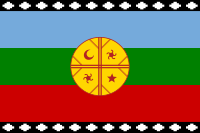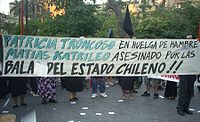- Mapuche conflict
-
Mapuche conflict is a collective name for the revival and reorganization of Mapuche communities for greater autonomy, recognition of rights and the recovery of land since the Chilean transition to democracy. The Mapuche conflict is a phenomenon mainly from Chile, but also from neighboring areas of Argentina. Demands revolve mainly around three themes: jurisdictional autonomy, return of ancestral lands and cultural identity.[1][2] Mapuches and supporters involved in the conflict have resorted to legal actions, lobbying among politicians and NGO's, hunger strikes, yet there have also been private property occupations, death threats and arson by some Mapuche groups which have led to clashes with Carabineros.
Contents
Background
The Mapuche conflict surfaced in the 1990s following the return of democracy. The conflict started in areas inhabited mostly by Mapuches like the vicinities of Purén, where some indigenous communities have been demanding that certain lands they claim for their own but which are now the property of logging and farming companies and individuals be turned over to them.[3] Several Mapuche organizations are demanding the right of self-recognition in their quality of Indigenous peoples, as recognized under the Declaration on the Rights of Indigenous Peoples by the General Assembly of the United Nations.
While the extent of autonomy and claimed benefits vary among the different Mapuche groups, many Mapuche organizations seek similar rights as those gained by the Inuit people in Greenland, the recognition of indigenous peoples in the constitution, and similar to the recognition of autonomous regional administrations and languages as in Spain.
The official 2002 Chilean census found 609,000 Chileans identifying themselves as Mapuches.[4] The same survey determined that 35 percent of the nation’s Mapuches think the biggest issue for the government to resolve relates to their ancestral properties.[4]
1996-2004: Ralco controversy
The building of the Ralco Hydroelectric Plant, Chile's largest hydroelectric power plant, in the 1990s was highly controversial among Mapuches and pro-Mapuche groups as it was to flood allegedly sacred land including one Mapuche cementery. After compensations were paid the plant was finally finished in 2004.[5] The project has proven controversial with local indigenous Mapuche since a graveyard had to be flooded by the dam.
2009 incidents
Numerous incidents such as land occupations and demonstrations have occurred in Araucania. In the wake of the recent deaths of a few of its activists, Mapuche organization Coordinadora Arauco-Malleco has played a key role by organizing and supporting land occupations and other direct actions that have ended up in clashes with the police. The government of Michelle Bachelet has said that it is not ready to contemplate expropriating land in the southern region of Araucania to restore lost ancestral territory to the Mapuche.[6] The government set out to buy land for use by 115 Mapuche communities, however, according to government officials, the current owners have nearly tripled the prices they are demanding. On the other hand, the effectiveness of the government policy of buying and distributing land has been questioned.[6] Two special presidential envoys were sent to southern Chile to review the increasingly fractious “Mapuche situation”.[4]
2010 hunger strike
2011: Mapuches in the Chilean student protests
See also
References
- ^ Identidad y conflicto mapuche en los discursos de Longkos y Machis (IX Región - Chile), por Jorge Araya Anabalón
- ^ Conflicto mapuche y propuestas de autonomía mapuche, por Javier Lavanchy
- ^ Latin American Herald Tribune "Chilean Authorities Investigate New Attack, Land Occupations". http://www.laht.com/article.asp?ArticleId=341129&CategoryId=14094 Latin American Herald Tribune. Retrieved 28 August 2009.
- ^ a b c The Santiago Times "CHILE INDIGENOUS CONFLICT MAKES POLITICAL WAVES". http://www.santiagotimes.cl/santiagotimes/index.php/2009082116951/news/political-news/chile-indigenous-conflict-makes-political-waves The Santiago Times. Retrieved 28 August 2009.[dead link]
- ^ Electricity generation capacity of Chile by Comisión Nacional de Energía
- ^ a b Latin American Herald Tribune "Chile Rules Out Land Seizures to Satisfy Indian Demands". http://www.laht.com/article.asp?ArticleId=342083&CategoryId=14094 Latin American Herald Tribune. Retrieved 28 August 2009.
Mapuche people Language 
Culture Related groups History Battle of the Maule · Arauco War · Malón · Araucanization · Kingdom of Araucania and Patagonia · Camino de los chilenos · Conquest of the Desert · Occupation of Araucanía · Mapuche conflictPeople Ainavillo · Alejo · Butapichón · Cadeguala · Calfucurá · Caupolicán · Clentaru · Colocolo · Curiñancu · Galvarino · Lautaro · Lientur · Michimalonco · Nangoniel · Pelantaro · Vilumilla · Santos Chávez · Elicura Chihuailaf · Aucán Huilcamán · Ceferino NamuncuráCategory Categories:
Wikimedia Foundation. 2010.


